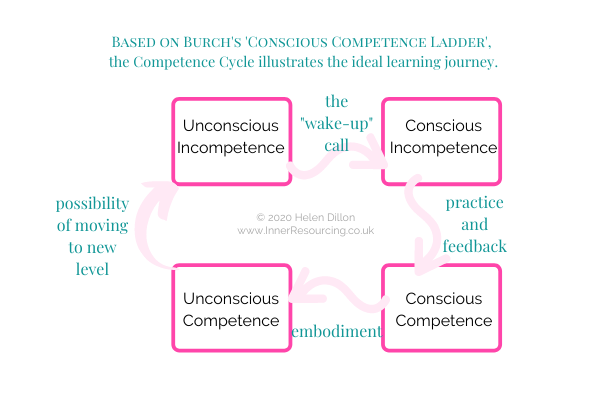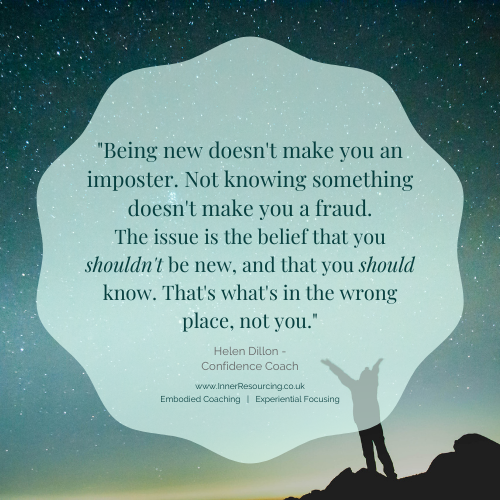Is it imposter syndrome or are you just new here?
Imposter syndrome is real.
It can stop you from showing up at your best at work and in relationships. It affects people at all stages of their lives and careers. And is often triggered by redundancy and the emotional and practical difficulties that arise.
Imposter syndrome is a hot topic right now. So when you feel like you don’t know what you’re doing, you might be tempted to wonder whether you’re developing it.
But sometimes, when you feel like you don’t know what you’re doing, it’s because, at some level, you actually don’t. Which is probably not what you want to hear, but bear with me…
Take an example: learner drivers are often all too aware of the extreme learning curve they’re on. And worry they don’t “belong” on the road.
This isn’t imposter syndrome. This is, in fact, ‘conscious incompetence‘ and is part of the journey of learning anything.
You’ve probably heard of this learning journey. It begins when you go from not knowing what you don’t know, to realising how much you don’t know. Driving looks easy when you’ve only watched other people do it. When you get behind the wheel, suddenly it can feel impossible.
I think of this as “the wake-up call”.

The evolutionary function of self-doubt
The ‘wake-up call’ jolts us into awareness. And prevents us from being blase about attempting dangerous new situations without due care and preparation. This is the evolutionary function of self-doubt.
Everyone has experienced this jolt in awareness from “This’ll be easy” to “I can’t do this!”.
The important thing to remember is that you might experience it even when you’re not a complete beginner.
Let’s break this down a bit more…
Is it imposter syndrome, or is it “the wake-up call”?
Here’s a couple of scenarios in which you might experience either…
Example 1 – a new job
- You’re normally fairly confident about your abilities. But when you start a big new job, you immediately have a wobble. You wonder whether you’ve bitten off more than you can chew.
This probably isn’t imposter syndrome, this is a normal response to a challenging new situation.
You might be experienced at the job, but you are new to that organisation, those people, and their expectations. You don’t quite know: “how they do things here”, who to ask for help, who you can rely on and who you can’t.
Of course, you might worry whether you can do this.
Example 2 – redundancy
- You’re good at your job, and you know how to get things done in your organisation. But then along comes redundancy and you’re plunged into uncertainty.
Depending on how redundancy is handled (and I’ve heard some horror stories) you may have a lot of emotional processing to do and little support to do it. You’ve got to rethink your CV, reboot your career, reorganise your day-to-day life. However robust you are, there’s almost certainly going to be some kind of hit to your confidence. That doesn’t mean imposter syndrome is inevitable AT ALL.
But redundancy IS a difficult experience to navigate and then on top of that (hopefully) you’ll also have a new job, or even a new career to navigate. Feeling wobbly about it all would be totally normal.
That’s why it’s important to seek help to regroup after redundancy and get a good handle on what your skills and strengths STILL are, if you find your self-belief sinking into your boots.
Example 3 – being in business
- You help people change their lives. But you’re struggling to market your business, be visible, and claim your “zone of genius” in your marketing.
This isn’t necessarily imposter syndrome either. Yes, there might be some elements of self-belief that need bolstering. But the main issue here is just as likely to be about lack of sales/marketing know-how. (Not to mention lack of clarity about your purpose and mission.)
You might be a genius at what you do, but you are waking up to the fact marketing yourself is harder than it looks.
A common factor
Remember our learner driver from earlier?
Now let’s imagine they’re no longer a learner. In fact, they’re more than competent.
But now they have to drive in a different country, where locals drive on the other side of the road. Where all the road signs and markings look odd, and they have to look the opposite way at roundabouts. Plus, they’re having to navigate an unfamiliar route in an unfamiliar car.
If you’ve ever done this, you’ll know that it’s disorientating.
It’s not that you don’t know how to drive. But it might feel that way.
Just like in a new job, or after redundancy, or starting a business, you haven’t suddenly lost all of your abilities, skills, and experience, but it might feel like you have.
This is not to suggest that you don’t need some kind of support in each of these example situations. But the support you need depends on where the issue lies.
Self awareness is the key
We’re dealing with a lot, all the time. Lots of input. Mega-uncertainty.
Add to that a new job, the upheaval of redundancy, or the million tasks that business owners need to get their heads round, and it’s hardly surprising if you’re struggling to keep up.
Alarm bells ring. More anxiety, feeling stressed, that creeping sense of things falling through the cracks.
You realise you’re feeling like you don’t know what you’re doing. And you’re kinda right – in the sense that you’re traveling in a foreign country, and you need to get used to that.
And of course nobody can know everything. …Shall I say that again?
Nobody, including you, can know everything, be good at everything straight off, and grasp every detail of what’s required in a new situation in 10 seconds flat.
And without self-awareness skills, without the ability to listen deeply to yourself, you might assume that this is a global “I don’t know what I’m doing – am I a fraud?” instead of a situational “I’m new here and I don’t know this.”
Self-awareness skills, listening to yourself, are vital. And support, support, support.

So what is Imposter syndrome?
Imposter syndrome is a repeating pattern of:
- undermining beliefs
- inner conflict
- not-enoughness
- anxiety
- perfectionism
- stress responses
- minimising your achievements
- chronic self-doubt and self-criticism
- a sense that you not only don’t deserve to be there – you never will.
It’s when you do have expertise, and yet you STILL struggle to believe it.
At core it’s a feeling of not belonging, not because you’re a beginner, like those learner drivers, but because you believe you are “not-good-enough” in some fundamental way. This core belief needs to change before imposter syndrome can be resolved.
Mind the gap
So where is your gap – is it in self-belief, or is it in knowledge? To figure out whether or not imposter syndrome is showing up, it can be helpful to separate the following:
- the content of what you do. What were you hired for (or are you aiming to be hired for)? What experience, skills, knowledge are required – and how do these match what you bring? In essence: are you skilled at what you do?
- the situation – does it need new skills, new information, new know-how? Are you being required to “drive on the wrong side of the road”? (Note that even if you’re an experienced professional, every new role/organisation comes with new challenges.)
An objective-as-you-can-manage assessment of these two aspects – the content and the situation – will help you understand what kind of support you might need. Is this really imposter syndrome? Or are you forgetting the fact that you are in a learning situation, and some degree of unconscious -> conscious incompetence is to be expected?
Is it a knowledge gap? In which case training or mentoring – a local guide – is likely to be helpful.
Or a self-belief gap? In which case confidence coaching to overcome imposter syndrome and build self-belief is the solution.
Perhaps it’s both. And of course imposter syndrome can be triggered, or made worse, by difficult circumstances.
Imposter syndrome triggers
Situations like the two examples above might trigger imposter syndrome, when combined with:
- high stress
- traumatic experiences (like a bullying boss or badly handled redundancy)
- lack of success (even if not your fault)
- and crucially, lack of support.
Especially if you already tend towards perfectionism, self-criticism, or anxiety.
Living with imposter syndrome
Imposter syndrome is not so much feeling insecure about a new job, or a new client. A certain amount of this is to be expected. It means you care.
Imposter syndrome is a chronic, or repetitive pattern that includes a mismatch between how you rate your skills, talents, and achievements, because they’re yours and how someone else would rate them.
Feeling not good enough, regardless of anything else.
If you suffer from imposter syndrome, you might not even apply for that big job or tender for that important piece of work, in the first place.
So it definitely limits your progress. It makes it harder to make a difference. And it takes away a lot of the joy of doing what you’re good at.
However, you can resolve imposter syndrome. You can change the pattern. There is a way out of this, so you are able to make more difference, feel confident, and experience the joy of a purpose-led life.
Imposter Syndrome breakthroughs
Humans can get stuck in repeating patterns that don’t serve them.
When that happens, something has to intervene to create change. Because we’re also really adaptable. We can cope with a lot before a change of pattern becomes essential.
Ironically, the more stress we’re under, the LESS likely it is that unhelpful patterns will change.
Because the more threat we experience, the more we rigidly we think and behave. Imposter syndrome is a protective pattern.
To break through it, you need to engage your “life forwards” energy. Life moves in the direction of more life. Patterns like imposter syndrome are constricting of life.
When you harness your “life forwards” energy you can shift, reset, and resolve unhelpful patterns. And generate fresh thinking and fresh ways of being. Like vibrant self-belief and flourishing confidence.
Which is why harnessing “life fowards” energy is a core teaching in all my programmes.
Check out my comprehensive, personal, confidence coaching programme “Confidence Rising”
